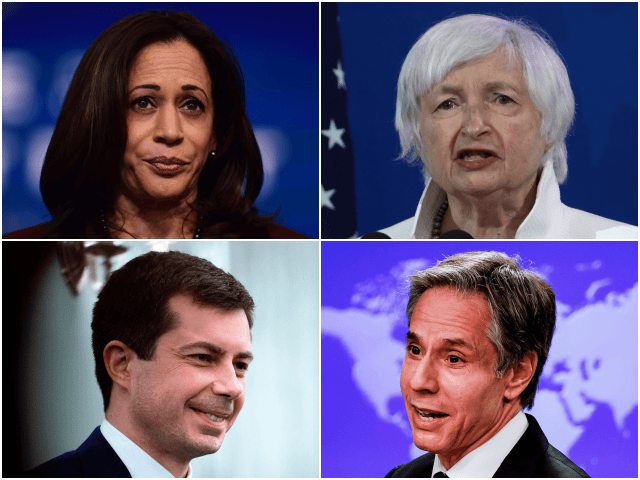The beneficiaries of Wall Street’s cash flow have stacked President Joe Biden’s cabinet picks to head various agencies, including the Treasury Department, Transportation Department, and State Department.
Despite claims to be at odds with Wall Street throughout the 2020 presidential election, Biden is stacking his cabinet with allies and the beneficiaries of some of the nation’s biggest banks. The appointments are not a surprise for the Washington, DC, beltway as Wall Street spent $74 million to unseat former President Trump.
When Vice President Kamala Harris was picked as Biden’s running mate, Wall Street executives and hedge fund managers praised the move, describing her as a “normal Democrat” who “was exceptionally well-received” by the big banks. One executive said of Harris, “What’s not to like?”
Treasury Secretary Janet Yellen, former Federal Reserve chairwoman, remains Biden’s most closely-connected Wall Street beneficiary. As Breitbart News reported, Yellen amassed more than $7.2 million from the big banks and multinational corporations over just a two-year period.
Specifically, Yellen took “speaking fees” from the likes of Citibank, Bank of America, Citadel, Barclays, ING, UBS, Goldman Sachs, Deloitte, Google, Salesforce, and HSM. In one case, Yellen accepted more than $800,000 in speaking fees from Citadel.
Secretary of State Antony Blinken and Department of Homeland Security (DHS) Secretary nominee Alejandro Mayorkas have each recently worked on behalf of Wall Street firms.
Blinken, for instance, advised firms such as Blackstone, Bank of America, Lazard, and McKinsey & Company while at WestEx Advisors. Mayorkas, as a corporate lawyer, also raked in payments from Blackstone.
Others in Biden’s cabinet like Commerce Secretary nominee Gina Raimondo and Transportation Secretary nominee Pete Buttigieg have deep connections to Wall Street. Buttigieg worked for McKinsey & Company between 2007 and 2010, representing clients like the health insurance giant Blue Cross Blue Shield and Best Buy.
Raimondo, Governor of Rhode Island, has been called subservient to Wall Street by populist leftists when her name first started being floated in October 2020 as a potential cabinet pick.
“Raimondo has built her career on subservience to Wall Street—and her selection would be an affront to organized labor,” David Segal of the Daily Poster said at the time. Raimondo has come under fire for her previous executive roles at financial firms Village Ventures and Point Judith Capital and for raking in hundreds of thousands of dollars from Wall Street since becoming governor.
The Federalist’s Jordan Davidson mentioned Raimondo’s Wall Street history last year:
She also was forced to return an illegal campaign donation after it was revealed that she was involved in a “pay-to-play scheme with Oaktree Capital — a $100 billion private equity group that Raimondo invested $20 million in state retirees’ funds as General Treasurer.” [Emphasis added]
In addition to her deep connections with Wall Street, Raimondo “cut pension benefits for public employees” and redirected “over $1 billion in state money to hedge fund investments.” [Emphasis added]
The role of Wall Street beneficiaries in Biden’s White House has not only been among his cabinet nominees. On his transition team, Biden filled a handful of jobs with employees from Visa, KeyBank, Citigroup, and Goldman Sachs.
This month, as Sen. Elizabeth Warren (D-MA) eyes a crackdown on private equity firms, Wall Street lobbyists are encouraged that Biden has packed his administration with a number of their friends, according to Politico:
But lobbyists are encouraged that the president-elect has started to populate his administration with officials who have ties to the industry. Biden’s incoming White House chief of staff is Ron Klain, who was previously general counsel at venture capital firm Revolution. Biden’s National Economic Council director will be Brian Deese, most recently the head of sustainable investing at asset manager BlackRock. Biden’s Covid-19 response czar will be Jeff Zients, who was CEO of investment firm Cranemere and will now focus on the pandemic health crisis. [Emphasis added]
Private equity representatives expect Biden’s core group of economic advisers will hear them out and that they will want to keep capital flowing as the country recovers from the pandemic. The firms are likely to tout commitments to diversity and climate change, which are high priorities for the Biden administration. [Emphasis added]
John Binder is a reporter for Breitbart News. Email him at jbinder@breitbart.com.

COMMENTS
Please let us know if you're having issues with commenting.